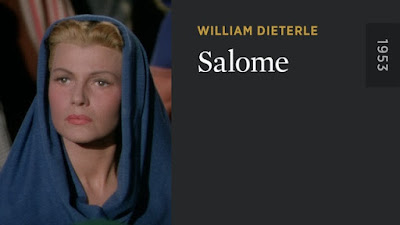I've written some pretty harsh reviews of older Biblical movies in the past, and generally take heat for it whenever I do. It's a genre that hasn't necessarily aged well. The earnestness of movies like The Song of Bernadette [review] has only grown more clunky over the decades, and some dramas like The Robe [review] now come off as more campy than intended. It's not that I am opposed to these kinds of movies, but it seems they need to be of a finer vintage, like DeMille's The King of Kings [review] or the silent version of Ben-Hur.
William Dieterle's 1953 interpretation of Salomé proves to be a solid exception, albeit an imperfect one. Rita Hayworth leads a fine cast as the stepdaughter of King Herod (Charles Laughton, Island of Lost Souls [review]). Herod's marriage to Salomé's mother (Judith Anderson, Rebecca [review]) has brought him unwanted attention from John the Baptist (Alan Bedel), a prophet in a new religion who also preaches sedition against Rome. While Herod is in service to Rome, he is afraid to move against the Baptist due to an old prophecy and his fears that the preacher may be the Messiah.
Salomé herself recently left Rome, tired of being persecuted and rejected by Roman men as an outsider. She is thus understandably upset to hear that her mother is suffering from small-minded bigotry, as well. Travelling with her is Claudius (Stewart Granger, Caesar and Cleopatra), an emissary sent to check up on Herod. Claudius turns out to be sympathetic to Herod's dilemma, sensing that harming the Baptist would turn the King's subjects against him. The soldier also turns out to be susceptible to Salomé's charms.
The gnarled motivations and backstory of Salomé is largely what makes the movie still interesting. At first I thought it odd that Harry Kleiner and Jesse Lasky Jr.'s script was working so hard to humanize the people who are, essentially, the villains of the piece, but this ends up working toward establishing Christianity as a transformative movement. John the Baptist's message appeals to the fundamental humanity in his oppressors, and it offers redemption to all, including Salomé, who ends up joining his cause. It's her mother who will be the one to demand the prophet's head.
No surprise there, really. Anderson is at her best when she is being selfish and shady. Laughton mainly sleepwalks through yet another bored ruler role, while Granger and Bedel play their parts with a stiff reverence. At times, they serve as little more than props on the elaborate sets, clotheshorses for the fancy costumes. The colorful photography of Charles Lane (Charade [review], Summer and Smoke) eclipses just about everyone. Salomé is a Technicolor delight.
Only Rita Hayworth, with the help of her trademark red hair, manages to stand out. As always, she is lovely, and she wears her gowns with elegance. (Her outfits were designed by Jean Louis, who also made Rita's knockout black dress in Gilda [review].) The actress struggles slightly with Salomé's naïveté, overdoing the wide-eyed routine just a tad. This could just be the downside of playing a character who was considerably younger than she was, even if she somehow still manages to look as fresh-faced and youthful as required. It was interesting to watch this film back-to-back with Miss Sadie Thompson [review], released in the same year. In that one, Hayworth plays a woman of some experience, and she is allowed to show her maturity, both in performance and appearance. You'd swear they were shot at least a decade apart.
The climax of Salomé is Hayworth performing the "Dance of the Seven Veils" to distract Herod. It's an excellent number, with both the costumer and the dancer delivering on the choreography's sensual promise. It's too bad that an uncut version of the routine doesn't exist. It's a crime every time Dieterle breaks away from his star to show the backstage shenanigans. It's Salomé's biggest selling point, and makes the more rickety plotting well worth sitting through.






No comments:
Post a Comment